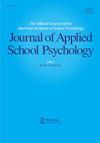Predicting kindergarten writing achievement using early written expression and behavior screening
IF 1.5
Q4 PSYCHOLOGY, EDUCATIONAL
引用次数: 1
Abstract
Abstract A concerning number of students fail to achieve writing proficiency, yet little attention has been devoted to examining why this occurs. While robust evidence indicates that behavior impacts reading and math achievement, the relationship between behavior and writing skills is unclear, particularly among young students. The authors examined the value of behavior screeners in predicting writing achievement, beyond the variance explained by early writing screeners alone. Additionally, various behavior domains (e.g., emotional, social, hyperactivity/inattention) were compared for their relative utility in predicting writing achievement. Data from a study of 95 kindergarteners were used for the analysis. Hierarchical regression was used to evaluate the added explained variance of the behavior screener and to compare the predictive ability of its domains. Results suggest that while problem behaviors and writing skills are negatively correlated, behavior screening does not improve on the ability of early writing screeners to predict concurrent writing achievement. The refinement of tools that predict writing achievement may improve the early identification of academic difficulties and allow educators to intervene before academic problems become intractable.运用早期书面表达和行为筛查预测幼儿园写作成绩
相当多的学生未能达到写作水平,但很少有人关注这一现象发生的原因。虽然有力的证据表明,行为会影响阅读和数学成绩,但行为与写作技能之间的关系尚不清楚,尤其是在年轻学生中。作者检验了行为筛选者在预测写作成就方面的价值,超越了早期写作筛选者单独解释的差异。此外,还比较了不同的行为领域(如情绪、社交、多动/注意力不集中)在预测写作成绩方面的相对效用。研究数据来自95名幼儿园儿童。使用层次回归来评估行为筛选器的附加解释方差,并比较其域的预测能力。结果表明,虽然问题行为与写作技能呈负相关,但行为筛查并没有提高早期写作筛查者预测并发写作成就的能力。预测写作成绩的工具的改进可能会提高对学业困难的早期识别,并允许教育工作者在学业问题变得棘手之前进行干预。
本文章由计算机程序翻译,如有差异,请以英文原文为准。
求助全文
约1分钟内获得全文
求助全文
来源期刊

Journal of Applied School Psychology
PSYCHOLOGY, EDUCATIONAL-
CiteScore
2.40
自引率
10.00%
发文量
7
期刊介绍:
With a new publisher (Taylor & Francis) and a new editor (David L. Wodrich), the Journal of Applied School Psychology will continue to publish articles and periodic thematic issues in 2009. Each submission should rest on either solid theoretical or empirical support and provide information that can be used in applied school settings, related educational systems, or community locations in which practitioners work. Manuscripts appropriate for publication in the journal will reflect psychological applications that pertain to individual students, groups of students, teachers, parents, and administrators. The journal also seeks, over time, novel and creative ways in which to disseminate information about practically sound and empirically supported school psychology practice.
 求助内容:
求助内容: 应助结果提醒方式:
应助结果提醒方式:


